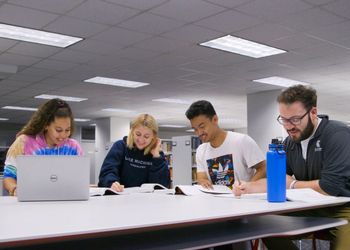Empowering Education with Generosity
“My parents didn’t come from money,” Annah said. “Education was important to them. They just didn’t have the means to pay for it.”
Empowering Education with Generosity
“My parents didn’t come from money,” Annah said. “Education was important to them. They just didn’t have the means to pay for it.”
January 8, 2015Annah Bravo felt limited her first few years as a college student. She had no scholarships and only enough in student loans to cover 12 credits per semester. That left her unable to enroll in electives or participate in additional academic opportunities that come, for example, with being a member of the urban or global educators cohort programs in the College of Education.
She didn’t have much extra time, either. For Annah, the oldest of four children, pursuing her dream of becoming a teacher at Michigan State University required juggling two jobs along with coursework throughout her entire college career. She had already spent her high school years working and finding scholarships—forgoing sports and other activities—to help her family pay for the benefits of learning at a high-quality parochial school.
“My parents didn’t come from money,” Annah said. “Education was important to them. They just didn’t have the means to pay for it.”
Despite her challenges, Annah has thrived at MSU. She found creative ways to keep progressing toward her degree without breaking the bank, such as taking a few courses at a community college and obtaining loans for summer courses. She maintained an outstanding grade-point average and became president of a campus-wide student group focused on fighting cancer.
Empowered by generosity
However, Annah’s worries about money never disappeared, especially after her mother had to quit her full-time job because of health reasons. Only when Annah began receiving scholarships funded by philanthropic gifts to the College of Education did the financial pressure begin to lift.
As a senior, Annah earned the Hazen J. and Margaret S. Wilson Endowed Scholarship for future K-8 teachers who demonstrate they can achieve their goals and have high moral values. Then going into her full-year teaching internship—when Spartan teachers are often willing to take on further debt knowing they will come out especially well prepared—Annah received the greatest level of support so far.
“This year, the two scholarships I received added up to almost $10,000,” she said. “That’s a HUGE impact because I’m not as stressed about having to work so much on top of the demands of the internship. I’m relieved because I still have a small loan, but I’m not going to have a large amount to pay.”
Her current awards include the College of Education Alumni Association’s scholarship specifically for teaching interns and the John M. Mason Scholarship in Science Education for teachers with a particular interest in science, Annah’s teaching major.
She no longer feels limited. She feels empowered.
Annah is forming strong relationships with third-graders in her mentor teacher’s classroom at Donelson Hills Elementary School in Waterford, Mich. She is getting closer to taking the lead in her own classroom. And she is ready to give back—to thank the generous individuals who supported her education by creating an outstanding education for her future students.
After years of personal sacrifice, she says, “Words cannot express how grateful I am for the financial help.”
An Engine of Opportunity: Support students
Today it is imperative to attract top talent to the education and health professions. Most students come to the College of Education because of their passion for teaching or promoting physical activity and human development, but the cost of higher education and the prospect of debt are growing obstacles. Those who come to us with the desire and ability to succeed, but who may be dissuaded by a lack of financial means, should be provided the same opportunities students from wealthier families.
Seeking a career in teaching can be especially daunting; the average starting salary for teachers in Michigan is $35,901. Considering the average debt is $23,725, it can make for a challenging start to this noble profession. Unlike most of their peers, students in the Spartan teacher preparation program also spend an entire academic year as teaching interns in schools. This makes a profound impact on their comparative success as full-time teachers. However, the combination of debt and paying for an additional year can present a formidable barrier.
Endowed scholarships and fellowships will ensure that we continue to attract the most qualified and diverse body of both undergraduate and graduate students. In addition, support for expenses such as internships, study abroad and research will allow more of our students to experience the full range of what MSU—and the world—has to offer.




